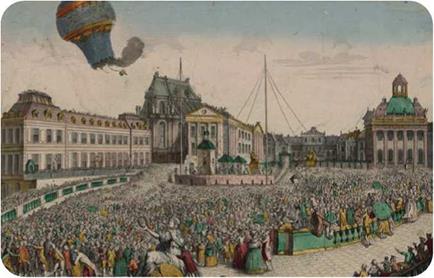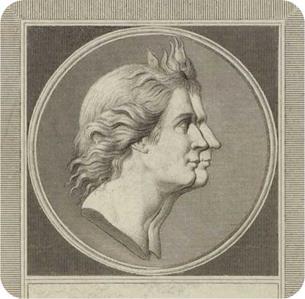Montgolfier, acques-Etienne and Joseph-Michel
Dates of birth: Joseph-Michel: August 26, 1740; Jacques-Etienne: January 6, 1745. Places of birth: Joseph-Michel: Blaruc-les-Bains, France; Jacques-Etienne: Annonay, France.
Died: Joseph-Michel: June 26, 1810; Jacques-Etienne: August 2, 1799.
Major contributions: Invented the first successful lighter-than-air balloon; carried out first flight of a manned balloon. Awards: Order of Saint Michel.
|
T |
he Montgolfier brothers were the sons of a prosperous paper manufacturer from southern France.
|
О This double portrait of the Montgolfier brothers was based on a relief sculpture of their profiles made by Jean-Antoine Houdon. |
Joseph-Michel was interested in science and had few business skills. Jacques – Etienne was trained to take over the family business.
During the early 1780s, Joseph – Michel noticed that a piece of paper rose in the hot air of a chimney. He started thinking about building a device that could use this effect to rise into the sky. Joseph-Michel built a small box of lightweight wood and covered it with fabric. He placed a wad of paper underneath the container and set the paper on fire. The container rose in the air until it hit the ceiling.
Joseph-Michel showed this discovery to his brother, and they began experimenting. In December 1782 the Montgolfiers built a larger container and tested it outside. The object rose nearly 70 feet (21 meters) on heated air and stayed aloft for a minute or so. The Montgolfier brothers went on to have more successful experiments. They built two larger globe-shaped containers held down by long ropes. The globes rose when heated, although they did not fly because of the ropes.
The Montgolfiers then prepared a large balloon to show the public their invention. They made a sphere out of tough sackcloth, covered it with four fabric panels held together by buttons, and surrounded the entire structure with netting to keep everything in place. On June 4, 1783, the Montgolfiers brought their invention to a square in their hometown of Annonay and lit a fire underneath the balloon. As a crowd
 О On September 19, 1783, the Montgolfier balloon rose over the French royal palace of Versailles, watched by the king and queen and a large crowd of spectators.
О On September 19, 1783, the Montgolfier balloon rose over the French royal palace of Versailles, watched by the king and queen and a large crowd of spectators.
watched in amazement, the balloon rose. The brothers estimated that it reached 6,000 feet (1.8 kilometers). Carried by the wind, it traveled about 1.2 miles (2 kilometers) before coming back to land.
The Montgolfiers took their discovery to Paris, where Jacques-Etienne demonstrated another balloon for members of the Academy of Sciences in mid – September 1783. King Louis XVI and Queen Marie Antoinette asked to see the invention for themselves. Accordingly, on September 19, 1783, Jacques-Etienne sent another balloon aloft. This time he attached a basket that carried a sheep, a rooster, and a duck. The balloon rose and floated on air for nearly 10 minutes, landing more than 1 mile (1.6 kilometers) away.
The first person to reach the balloon after it landed was a physician, Jean – Frangois Pilatre de Rozier. Excited, he volunteered to go aloft. During the next few weeks, Jacques-Etienne built a balloon that measured 75 feet (23 meters) high and 46 feet (14 meters) across. It had a basket with a container that could hold and sustain a fire to keep the balloon aloft. The brothers tested it several
times with Jacques-Etienne or de Rozier. on board but with the balloon held down by ropes. Then, on November 1, 1783, de Rozier and a French army major entered the basket and lit the fire. Once the balloon was cut loose, it rose into the air. They cruised for 25 minutes, traveling about 5 miles (8 kilometers) over Paris.
The brothers continued experimenting. On January 19, 1784, Joseph – Michel went aloft along with de Rozier and five others. Thereafter, the Montgolfiers abandoned balloons and devoted themselves to other work. Joseph-Michel tinkered with some experiments not connected to flying. Jacques-Etienne returned to papermaking and invented a method for making vellum, a strong kind of paper.
——————————————————————-
SEE ALSO:
• Aerodynamics • Aeronautics
• Balloon
_____________________________________________ J











